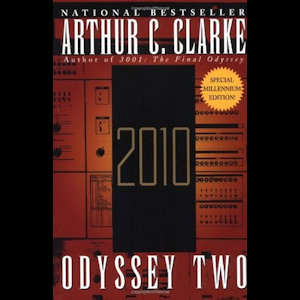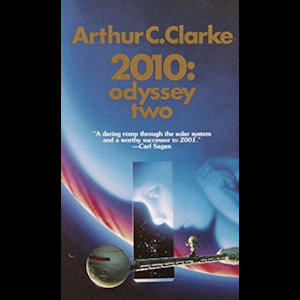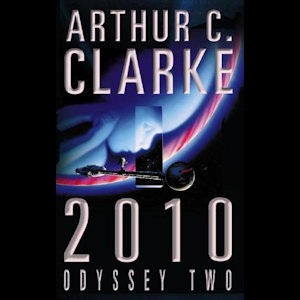The Summer of Arthur C. Clarke: 2010: Odyssey Two
Before I begin, welcome to my Summer of Arthur C. Clarke. On the heels of last year's popular Slasher Summer, this year I'm leaving behind the guilty pleasure of the niche horror genre and exploring something a little closer to my own heart: namely science-fiction. Of all the sci-fi greats, none have influenced me more than the late Arthur C. Clarke, my personal favorite of the "Big Three" from the Golden Age of the genre (Asimov, Clarke, and Heinlein). This summer, I am going to look at a few of his most famous works, including the entirety of his 2001 series and the tiny handful of adaptations that have been made for film, television, and video games. Strap in and prepare yourselves for a journey into the stars and the mind, and let us never forget how much richer the world of fiction is for having been blessed by the incomparable Sir Arthur C. Clarke.
 | | It's full of stars |
The story of Dave Bowman, HAL, and the monoliths isn't over. Humanity still doesn't know what happened at Jupiter, and the young Star Child hasn't yet learned its purpose in the grand scheme of an ever-expanding cosmos. A Russian craft, the Alexi Leonov is constructed to rendezvous with the derelict Discovery as it begins falling towards the moon of Io, and in a remarkable show of cooperation between superpowers, three Americans are allowed to tag along, including the man who organized the Discovery mission to begin with: Dr. Heywood Floyd.
Even though it has a more complicated plot, 2010: Odyssey Two feels like a tighter, more focused story than the previous novel. Perhaps this is simply the streamlining of protagonists down to just Heywood Floyd (with brief interruptions from the Star Child version of Dave Bowman) and the lack of a primitive man opening. It could also be the slightly lowered sense of mystery for the reader given the reader already knows the solution to the mystery that drives Floyd: what happened to Bowman. Or maybe it's Clarke's more refined writing style. No matter the reason, 2010 is a less dense affair and one of Clarke's most accessible books.
It's fitting, then, that this was the first Clarke novel I was exposed to. Like with its predecessor, it's difficult for me to be objective, but rather than it being the result of intense academic study in my youth, it's because 2010 was something of a bedtime story for me when I was even younger. I had a regular babysitter who would read this novel to me, and I grew to demand it. I was so young, I barely understood what was happening, but I knew it was fascinating, important, and wonderful. It's one of the few discrete things I can point to as being influential on the kind of writer I would become, and one of the starting points for my love of science-fiction (which was bolstered by my father's infatuation with Forbidden Planet and my entire family's obsession with Star Trek).
 | | That's a big head |
If I try to put that aside, however, and look at 2010 more objectively, I still encounter one of Clarke's best works. It's better in almost every way from its predecessor, and it doesn't get as esoteric as its two sequels. Naturally, it's one of Clarke's most anachronistic works as well, not only because it misrepresents a year that we're already well past but also because it relies on a state of world affairs that seemed inevitable when 2010 was written: the Cold War is still in effect. Granted, it isn't as pronounced a problem for the novel as it is the film (which we'll get to in short order), but it is still there.
The science, though, is up to Clarke's standard, in that it is hard to believe he got so much right so long ago. He's one of the first writers to propose life on Europa and demonstrates an imaginative playfulness with sound science to explain relatively simple plot points, such as the proposed sulfur storms between Io and Jupiter being the cause of the Discovery's slowly descending orbit. His deeper explanations of HAL's abberant behavior are wonderfully logical and show a pretty sophisticated understanding of artificial intelligence for someone writing in the early eighties.
All of his human characters, too, are more psychologically dense. As a protagonist, Floyd is in many ways still bound by Clarke's tropes of scientific stoicism, but he is a more flawed and emotional character than he was in 2001. On top of that, Floyd is beset by some of Clarke's more interesting ancillary characters in Captain Orlova and Walter Curnow, and nearly overshadowed by Dr. Chandra, HAL's creator whose aloofness around humans is balanced by his deep emotions for his artificial children. Even Bowman is more interesting, despite being an incorporeal phantasm operating at the behest of an unknowable overseeing intelligence. Clarke inserts some incredibly progressive (and prescient) views on sexuality and social norms into the backgrounds of his characters, too, selling his own controversial sociopolitical opinions well by refusing to belabor the point as he does in some of his other utopic visions.
 | | Seriously, I love this book |
There's also a better sense of pace and rhythm throughout. While some of Clarke's poetry--one of 2001's main strengths--is toned down, his ability to convey a lot of information in a short period of time is astounding. His wry sense of humor fills in the gaps, but never at the expense of getting his point across. At this stage of his writing career, Clarke has become a master of science communication, and though I won't be discussing his non-fiction works this summer, they certainly informed his fiction as much if not more than his fiction informed them. If I must find a complaint in Clarke's writing style in 2010, it would be his repetition. Not only does he sometimes use the same metaphor a few times to describe the same thing, he also pilfers whole chapters from 2001 without changing more than a few sentences.
This is a minor, nitpicky complaint, however. 2010 is a refined, spectacular work that competes with only one or two others for the title of my favorite Clarke novel. As one of his most traditionally structured narratives, 2010 is also the book I would recommend first when introducing newcomers to Sir Arthur, even going so far as to say skip 2001; all the important plot details from the previous book are efficiently explained for anyone unfamiliar with them, and as I made clear last week, the film is better anyway.
That brings me to one interesting tidbit about 2010: it's actually a sequel to Kubrick's film more than it's a sequel to Clarke's original novel. I'm sure there are other examples out there in the vast open worlds of fiction, but this is the only instance I can think of where an adaptation is done so well it convinces the writer of the original work to go by the adaptation when writing a sequel. 2010 would get a film adaptation of its own, of course, but even though I will argue it's still a sterling adaptation, it's not so great that Clarke would feel the need to incorporate too many of its differences into 2061: Odyssey Three. But I get ahead of myself. Tune in next week for that discussion.
-e. magill 6/14/2018
THE UNAPOLOGETIC GEEK'S
SUMMER OF ARTHUR C. CLARKE: | |
|
|
|